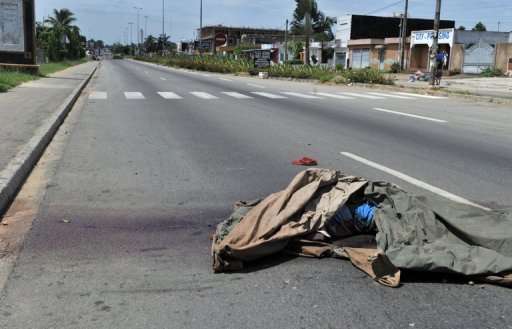Ivory Coast’s Alassane Ouattara enforces blockade around his rival Laurent Gbagbo’s Abidjan residence as UN says it had found more than 100 bodies in west of the country
 Ivory Coast's internationally recognized president Alassane Ouattara enforced a blockade Friday around his rival Laurent Gbagbo's Abidjan residence, as the UN said it had found more than 100 bodies in the west of the country.
Ivory Coast's internationally recognized president Alassane Ouattara enforced a blockade Friday around his rival Laurent Gbagbo's Abidjan residence, as the UN said it had found more than 100 bodies in the west of the country.
Reports of massacres in the west of the country emerged last week as Ouattara's forces swept through the region on their way to confronting Gbagbo in Abidjan. "The human rights team investigating... in west Cote d'Ivoire found more than 100 bodies in the past 24 hours in three locations," Rupert Colville, spokesman for the UN High Commissioner for Human Rights, said in Geneva. "All the incidents appear to be ethnically motivated," he added.
Ouattara promised in a televised address Thursday that "light will be shed" on the reports of massacres and other crimes. "The authors of the crimes will be punished," he said, calling on his troops "to be exemplary in their behavior and to abstain from any crime, any violence against the population or any act of pillage."
Several hundred people were reportedly massacred in the western town of Duekoue last week, with forces loyal to Gbagbo and Ouattara blaming each other.
The International Criminal Court in The Hague has said it plans to launch a formal probe into alleged mass killings.
 Meanwhile in Abidjan residents reported explosions and gunfire and bodies lay in the streets amid efforts to force Gbagbo to give up the presidency, with food stocks running low, water and power supplies erratic and security plummeting, witnesses said.
Meanwhile in Abidjan residents reported explosions and gunfire and bodies lay in the streets amid efforts to force Gbagbo to give up the presidency, with food stocks running low, water and power supplies erratic and security plummeting, witnesses said.
Gbagbo was still hunkered down in a bunker in the presidential residence after Ouattara's forces failed to remove him in an aborted assault on Wednesday.
In Washington US Secretary of State Hillary Clinton and UN chief Ban Ki-moon issued an alert on a potential humanitarian crisis while denouncing attacks on UN peacekeepers.
Meanwhile the World Food Program and other UN relief agencies on Friday called for humanitarian corridors in Ivory Coast to allow safe access to thousands of people who have fled the fighting.
On Thursday, Ouattara went on television to announce the blockade and calling on his troops to restore order in Abidjan, where roaming militia have been engaged in looting and random attacks in recent days. "A blockade has been set up around (the) perimeter" of Gbagbo's residence to make the district safe for local residents, said Ouattara, claiming Gbagbo had "heavy weapons and mercenaries" at hand.
Addressing Ivorians for the first time since the country's post-election crisis came to a head, Ouattara appealed for national reconciliation and a resumption of economic activity in the world's leading cocoa producer. "The curfew will be relaxed as from Friday April 8 to enable a progressive return to normality," he declared.
UN Secretary General Ban urged Gbagbo to quit power before it was "too late" while the Ivory Coast ambassador to the UN said Gbagbo would be taken alive and put on trial. "Sooner or later he will be captured and brought to justice," Youssoufou Bamba told a press conference, while insisting that Ouattara wants his rival taken alive even though his forces have carried out one offensive against the Gbagbo bunker.
